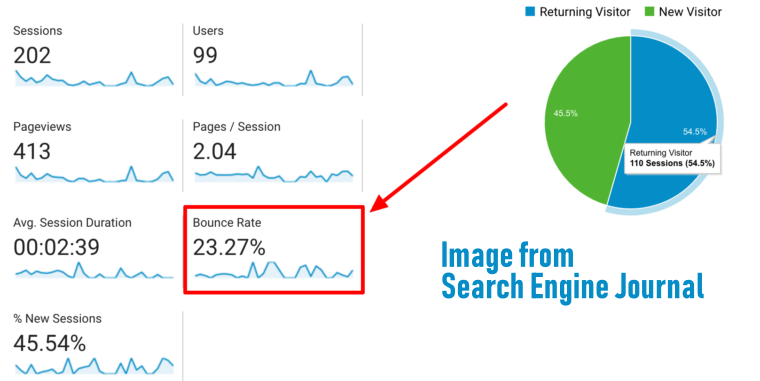This blog post will explain to you how quality content writing and copywriting can help you keep your bounce rate low.
Having a low bounce rate is beneficial to your business at multiple levels.
It improves your search engine rankings.
It keeps people longer on your website and hence, improves your conversion rate.
The converse is also true: having a higher bounce rate is detrimental to your SEO and it also has an adverse effect on your conversion rate.
SEMRush says that your bounce rate is the 4th most important factor in deciding your search engine rankings.
Though, according to Search Engine Journal Google does not directly take into account your bounce rate in its search ranking algorithm, Google is increasingly using RankBrain and then consequently, searcher intent, to decide your search engine rankings and in this resspect, bounce rate becomes very important.
What is website bounce rate? Explained
Do you use Google Analytics?
When you check your details in Google Analytics, at the top you can also see your bounce rate.
If the bounce rate has increased, you see the information in red (meaning, not good) and when the bounce rate has decreased, you see the information in green (meaning, good).
How is the bounce rate calculated?
It is something like this:
Suppose in a given timeframe
- X people visit your website, let’s say from Google,
- Y among these people leave your website without checking another link
then,
Y divided by X and then the whole thing multiplied by 100 gives you your bounce rate.
In terms of mathematical formula,
Ideally, people should stay on your website to explore further.
When you have a lower bounce rate, it indicates to Google that there is valuable information on your website, and you are not simply tricking your way into better search engine rankings.
What’s a good bounce rate?
It differs from industry to industry.
On an average, 20-40% bounce rate is good.
You can use quality content writing and copywriting to improve your bounce rate
Recently I published the following blog post: Content marketing success is impossible without quality content writing.
A long time back I wrote a web page on the difference between content writing and copywriting and in there I had briefly touched upon how good copywriting affects your conversion rate.
The same holds true for your bounce rate: sales oriented content writing is almost same as copywriting so when you are thinking of reducing your bounce rate you should think like a copywriter also.
This post was inspired by this Search Engine Journal blog post on more or less the same theme: if you are not aiming for the #1 position, you are fighting a losing battle.
Why is it so?
It is because publishers (or service providers) who enjoy higher search engine rankings (top 1-5 spots) are giving Google exactly the content Google looks for, for higher search engine rankings, and this gives them a leverage for all the content that they publish.
One of the important attributes Google looks for when it is ranking your content, is your bounce rate.
This is because Google wants to evaluate the overall quality of your website rather than one off blog posts or articles or web pages.
Primarily, there are two reasons why people leave your website after just accessing the link they have found on Google:
- They were not impressed by your content and hence, didn’t expect to find anything worth a second glance on your website.
- Although they were satisfied, you didn’t give them an incentive to check out other links on your website.
The second point is just a usability issue.
Maybe a navigation bar is missing on the link.
Maybe there is no other link on the web page or blog post.
The first point is a dangerous point.
If people are not impressed with your content, they don’t stay on your website and if they don’t stay on your website, they don’t do business with.
Why is it important for people to stay on your website after they have checked out the link they found on Google?
Although there might be multiple web pages and blog posts that draw people to your website from the search engines, you need people to check out relevant web pages that prompt them to do business with you.
For example, if you land on this blog post trying to find out how you can improve your bounce rate with quality content writing, and if you are looking for a good content writer, you will need to check out my other web pages to be able to make up your mind and then submit my contact form.
Of course, if you are mainly looking for information and if this blog post satisfies you there is no problem in your leaving immediately after accessing this web page.
But, there is a problem if you need a quality content writer but you still leave my website without checking out other web pages.
It means as a content writer I haven’t impressed you and convinced you.
To get business, I don’t need to stop everyone from moving away from my website, I just need to stop those people who are looking for a reliable content writer.
Similarly, the quality and relevance of your content should be able to convince people into checking out the relevant sections on your website.
Quality content writing has a cascading effect on your bounce rate
When I talk about quality content writing, I am primarily focusing on relevance.
Quality in terms of writing without mistakes (factual and syntactical) I take by default.
Relevance is very important. Is your particular blog post or web page relevant to the person who has just landed on this particular link?
If you have come to this blog post straight away, does it give you the answer you were looking for when you used your query on Google or any other search engine?
After relevance, another factor that contributes to what quality content writing (and consequently, a lower bounce rate) is the way you format your text.
On the Internet, especially when people access your content on their mobile devices, it is very important that people are able to read your content easily.
It means keep your sentences are short.
Keep your paragraphs short.
Avoid overtly complicated words and expressions.
Basically, keep your content to mobile friendly.
Maintain a flow in such a manner that the previous sentence connects to the next sentence and form a collective narrative. This is very important to keep people reading what you have written.
After that, keep your writing conversational.
When you are writing, write as if you’re talking to someone. Don’t write as if you are talking to 50 people. Write as if you’re talking to just one single person.
Use internal linking strategically. Don’t overdo, but use other links from your web site or blog contextually.
Make sure that the link doesn’t needlessly take people away from what they are currently reading, but encourages them to check out extra information if need be. This way, they will have more reason to stay on your website.
Repeatedly I come back to relevance, problem solving and serving the purpose. Take care of these attributes while content writing and you can definitely improve your bounce rate.



